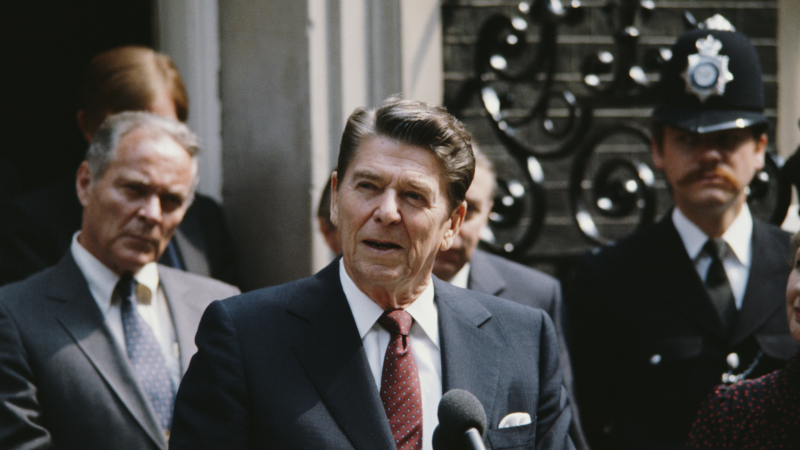Democracy-promoting organization sues the Trump administration over withheld funds
The National Endowment for Democracy (NED) is suing the Trump administration for denying it access to nearly $240 million in congressionally approved funding. The suit, which was filed Wednesday night in federal district court in the District of the Columbia, is the latest in which an organization has sued the government for refusing to release money already approved by Congress.
The NED supports everything from democracy activists in Hong Kong to independent press coverage of Iran.
NED officials say the halt in funding has created a “devastating” cash flow crisis that has forced it to furlough 75% of its staff and threatens its existence.
“NED is a venture capital fund for democracy, with 83% of its resources going directly to support people fighting for freedom of speech, thought, and religion,” said former Republican congressman and current NED Chair Peter Roskam in a statement. “The sudden withholding of our funds endangers that mission and cripples a force multiplier for America’s national interest.”
The suit names the State and Treasury departments as defendants as well as their leaders, Marco Rubio and Scott Bessent, in their official capacities. Those departments have yet to file a response in court. The State Department said it does not comment on pending or ongoing litigation.
Rubio is a former board member of the International Republican Institute, which receives funding from the NED. In 2017, Rubio thanked the Endowment for its work to “advance the cause of freedom and carry out the vision President Reagan articulated those many years ago.”
Treasury has not yet responded to requests for comment from NPR.
The suit also names the White House Office of Management and Budget and its director, Russell Vought, in his official capacity.
Bipartisan history
Congress created the National Endowment for Democracy in 1983 to support democracy, extend American soft power and counter Soviet influence. Support was bipartisan. President Ronald Reagan laid the rhetorical foundations for the initiative in a 1982 speech to the British Parliament.
“If the rest of this century is to witness the gradual growth of freedom and democratic ideals, we must take actions to assist the campaign for democracy,” Reagan said. “The objective I propose is quite simple to state: to foster the infrastructure of democracy.”
By holding up funding for the NED and the U.S. Agency for International Development, the Trump administration is now making moves that would dismantle that infrastructure.
Criticism at home and abroad
While the NED has enjoyed decades of support on both sides of the aisle, it does have critics.
The Center for Renewing America, a conservative think tank previously run by Vought, has called the NED a “partisan political weapon” that meddles in the internal affairs of other countries and creates turmoil. Chinese Communist Party leaders have accused the NED of trying to destabilize the country by supporting Tibetan, Uyghur and Hong Kong human rights activists.
Roskam, the NED chair, says the biggest beneficiaries from the Trump administration’s funding halt are authoritarian leaders from Moscow to Havana.
“The best way to challenge tyrants is to empower their citizens,” Roskam wrote in the National Review. “That’s exactly what NED does.”
Taiwan’s president pledges to defend island’s sovereignty after Chinese military drills
Taiwanese President Lai Ching-te vowed to defend the self-ruled island's sovereignty in the face of what he termed China's "expansionist ambitions," days after Beijing wrapped up live-fire military drills near its shores.
Deaths reported during widening protests in Iran sparked by ailing economy
The protests began due to economic pressures, with Iran's currency rapidly depreciating. Demonstrators have also chanted against the country's theocracy.
Congress failed to extend Obamacare subsidies. This Democrat says Trump can save them
Sen. Peter Welch, D-Vt., says he thinks the Senate can pass a "retroactive" Affordable Care Act subsidy extension, but "we need President Trump."
Rideshare union rights, social media limits and other state laws taking effect Jan. 1
Every new year, public media reporters across the country bring us some of the new state laws taking effect where they are. Here are six in 2026.
Guides to help you tackle your New Year’s resolutions
From building your strength to tackling credit card debt, NPR's Life Kit has a newsletter journey to help you tackle your New Year's resolution.
Guides to help you tackle your New Year’s resolutions
From building your strength to tackling credit card debt, NPR's Life Kit has a newsletter journey to help you tackle your New Year's resolution.






